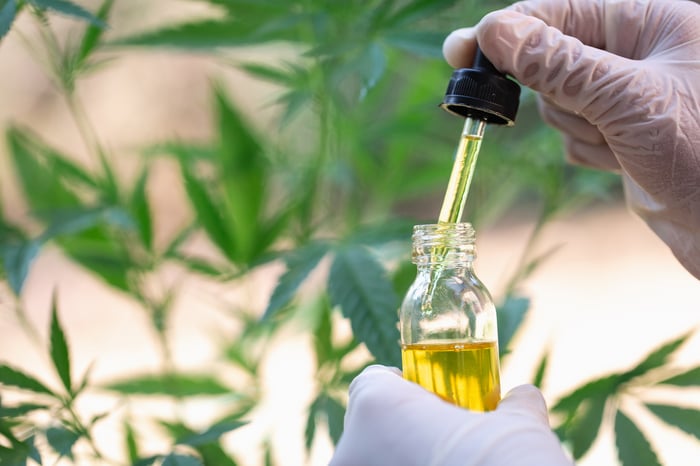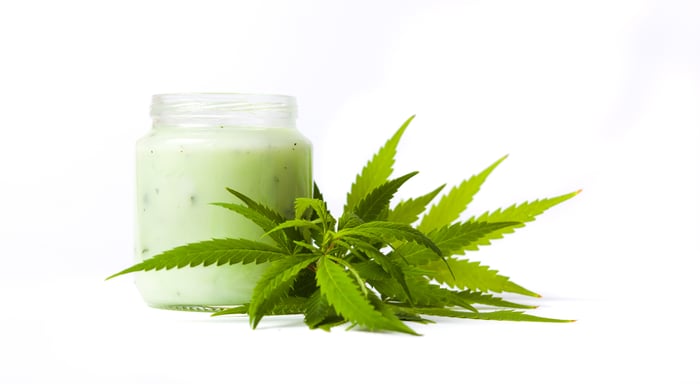The marijuana industry is on fire, and Wall Street has certainly taken notice. Over the past couple of years, pot stocks have run circles around the broad-based S&P 500 in terms of total return, which isn't hard to believe considering that Wall Street estimates call for a quintupling, at minimum, in worldwide cannabis sales through 2029.
But the marijuana industry is far more complex than simply growing plants and selling dried flower to consumers. Rather, there are numerous ancillary businesses and niches within the cannabis space that are thriving above and beyond what we've witnessed as a whole. Perhaps no aspect of the green rush is more exciting than the rise of cannabis derivatives and cannabidiol (CBD).

Image source: Getty Images.
CBD has become the hottest thing since sliced bread
According to estimates from the Brightfield Group, CBD sales -- CBD being the nonpsychoactive cannabinoid best known for its perceived medical benefits -- are expected to soar from $591 million globally in 2018 to $22 billion worldwide by 2022. For those of you scoring at home, that's a 147% compound annual growth rate.
What Wall Street and investors seem to find most attractive about the rise of CBD is that it may appeal to consumers who might otherwise want nothing to do with the cannabis industry. Since CBD-based products typically contain no traces of, or minute amounts of, tetrahydrocannabinol (THC), the cannabinoid that gets a user high, consumers on the medical and recreational side of the equation tend to be more willing to try CBD-based products.
Furthermore, businesses benefit from the rise of CBD because it's a considerably higher-margin product than traditional dried cannabis flower. With tobacco smoking rates hitting a more than five-decade low in the U.S., the allure of smoking any product (tobacco or cannabis) is waning. Instead, a new generation of cannabis users prefer alternative consumption options, including vapes, edibles, topicals, concentrates, and oils, to name a few. All of these higher-margin derivatives can be targeted at a CBD-seeking customer base with little fear of oversupply or pricing pressure.
These nine retailers have jumped on the CBD bandwagon
Just how popular have CBD products become? Well, nine major retailers, both public and private, are now selling CBD-based products. Here's a look at the wide gamut of retailers now carrying CBD oils, topicals, and capsules.

Image source: CVS Health.
Health and wellness retailers
Three of the most prominent health and wellness retailers to jump on the CBD bandwagon were pharmacy operators CVS Health (CVS 1.04%), Walgreens Boosts Alliance (WBA 0.45%), and Rite Aid (RAD 25.00%). CVS Health kicked things off by announcing that it would carry CBD topicals in roughly 800 of its stores spanning eight states in March. Just days later, Walgreens Boots Alliance followed with a corresponding move to carry CBD-containing topicals in nearly 1,500 of its U.S. locations. Most recently, Rite Aid joined the party, announcing plans to carry CBD products in two states (Washington and Oregon). Considering that front-end sales for CVS Health, Walgreens, and Rite Aid tend to have very low margins, the introduction of CBD products may slightly boost margins, or at the very least improve foot traffic into their stores.
Beauty retailer Ulta Beauty (ULTA -2.38%) is a fourth brand-name retailer carrying CBD-based products. In mid-March, Ulta announced plans to carry five skin-care products from Cannuka that blend CBD with manuka, a type of honey that's sourced from bees that pollinate Manuka trees. Ulta is currently able to sell these CBD skin-care products in all but three states (Nebraska, South Dakota, and Idaho) where CBD laws remain very strict.
A fifth major wellness retailer where a consumer can pick up CBD products is GNC Holdings. GNC recently began selling a variety of CBD-infused topical creams of varying strengths. Known for supplying everything from performance supplements to health and beauty products, GNC's entrance into the CBD space was a logical move designed to appeal to the full spectrum of its customer base.

Image source: Getty Images.
Apparel and accessories retailers
In addition to brand-name health and wellness retailers, four major apparel, accessory, and general retailers are now offering CBD products for sale.
Continuing the running list, Designer Brands (DBI -1.25%) is a sixth major retailer selling CBD creams and balms. Designer Brands, which is formerly known as DSW, hooked up with Green Growth Brands and its Seventh Sense line of CBD-infused products to test these products in 10 of its stores. After 74% of the product sold in a 10-week span, Designer Brands decided to expand this partnership to include 96 of its U.S. stores and nearly 55,000 total units of product. Interestingly enough, Green Growth's current CEO used to be Designer Brands' president.
Teen and young-adult-focused retailer Urban Outfitters (URBN -1.65%) is a seventh major retailer now selling CBD products. Urban Outfitters agreed to carry products from CBD for Life (a brand being acquired by iAnthus Capital Holdings in two of its California stores and four of its New York stores as a trial. Taking into account that younger people tend to have a more favorable view toward cannabis and CBD products than older Americans, the move to carry CBD products by the young-adult-focused Urban Outfitters is a no-brainer.
Along with Designer Brands, privately held luxury retailer Neiman Marcus also moved into the CBD space in mid-January. Neiman announced plans to carry a variety of CBD products at five of its locations, as well as online. Since CBD products tend to be priced at a premium to traditional cannabis flower, it plays perfectly into Neiman's attraction of a more affluent clientele.
A ninth and final "retailer" that I'll include in this list is Simon Property Group (SPG -1.85%). Although Simon Property Group doesn't directly sell CBD products, as the largest mall operator in America, it's directly responsible for approving or denying what stores goes into its malls. Recently, Simon Property Group and Green Growth Brands came to an agreement that allows Green Growth to open 108 shops in Simon's malls this year to sell products containing CBD.
Big things may be happening with the marijuana industry, but CBD is where the real excitement lies.





